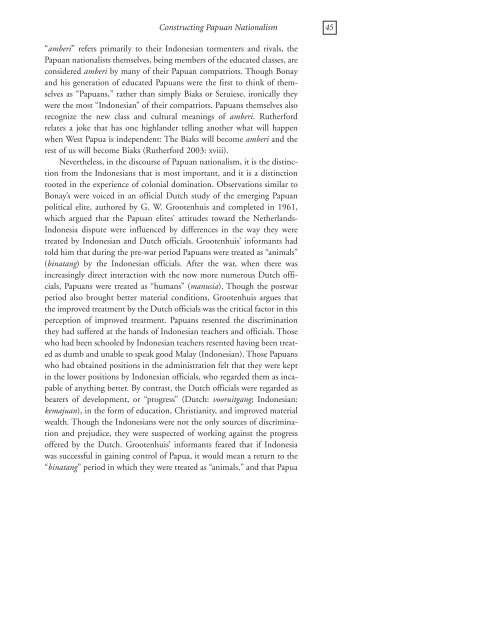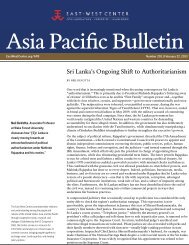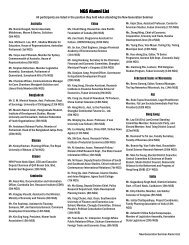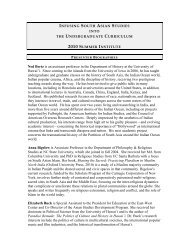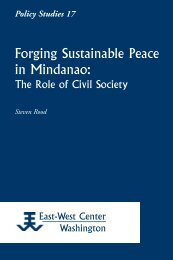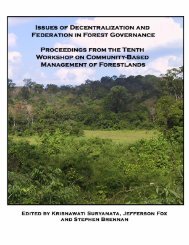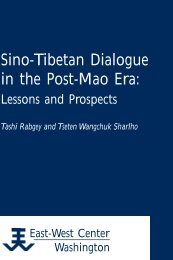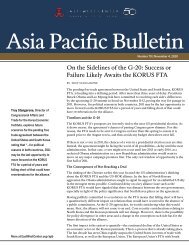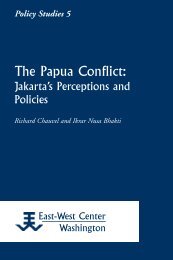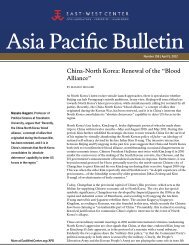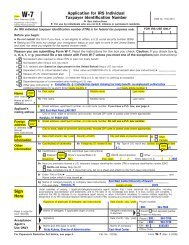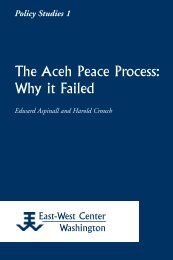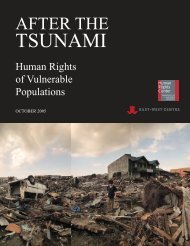Constructing Papuan Nationalism: History, Ethnicity ... - ScholarSpace
Constructing Papuan Nationalism: History, Ethnicity ... - ScholarSpace
Constructing Papuan Nationalism: History, Ethnicity ... - ScholarSpace
- No tags were found...
Create successful ePaper yourself
Turn your PDF publications into a flip-book with our unique Google optimized e-Paper software.
<strong>Constructing</strong> <strong>Papuan</strong> <strong>Nationalism</strong> 45“amberi” refers primarily to their Indonesian tormenters and rivals, the<strong>Papuan</strong> nationalists themselves, being members of the educated classes, areconsidered amberi by many of their <strong>Papuan</strong> compatriots. Though Bonayand his generation of educated <strong>Papuan</strong>s were the first to think of themselvesas “<strong>Papuan</strong>s,” rather than simply Biaks or Seruiese, ironically theywere the most “Indonesian” of their compatriots. <strong>Papuan</strong>s themselves alsorecognize the new class and cultural meanings of amberi. Rutherfordrelates a joke that has one highlander telling another what will happenwhen West Papua is independent: The Biaks will become amberi and therest of us will become Biaks (Rutherford 2003: xviii).Nevertheless, in the discourse of <strong>Papuan</strong> nationalism, it is the distinctionfrom the Indonesians that is most important, and it is a distinctionrooted in the experience of colonial domination. Observations similar toBonay’s were voiced in an official Dutch study of the emerging <strong>Papuan</strong>political elite, authored by G. W. Grootenhuis and completed in 1961,which argued that the <strong>Papuan</strong> elites’ attitudes toward the Netherlands-Indonesia dispute were influenced by differences in the way they weretreated by Indonesian and Dutch officials. Grootenhuis’ informants hadtold him that during the pre-war period <strong>Papuan</strong>s were treated as “animals”(binatang) by the Indonesian officials. After the war, when there wasincreasingly direct interaction with the now more numerous Dutch officials,<strong>Papuan</strong>s were treated as “humans” (manusia). Though the postwarperiod also brought better material conditions, Grootenhuis argues thatthe improved treatment by the Dutch officials was the critical factor in thisperception of improved treatment. <strong>Papuan</strong>s resented the discriminationthey had suffered at the hands of Indonesian teachers and officials. Thosewho had been schooled by Indonesian teachers resented having been treatedas dumb and unable to speak good Malay (Indonesian). Those <strong>Papuan</strong>swho had obtained positions in the administration felt that they were keptin the lower positions by Indonesian officials, who regarded them as incapableof anything better. By contrast, the Dutch officials were regarded asbearers of development, or “progress” (Dutch: vooruitgang; Indonesian:kemajuan), in the form of education, Christianity, and improved materialwealth. Though the Indonesians were not the only sources of discriminationand prejudice, they were suspected of working against the progressoffered by the Dutch. Grootenhuis’ informants feared that if Indonesiawas successful in gaining control of Papua, it would mean a return to the“binatang” period in which they were treated as “animals,” and that Papua


